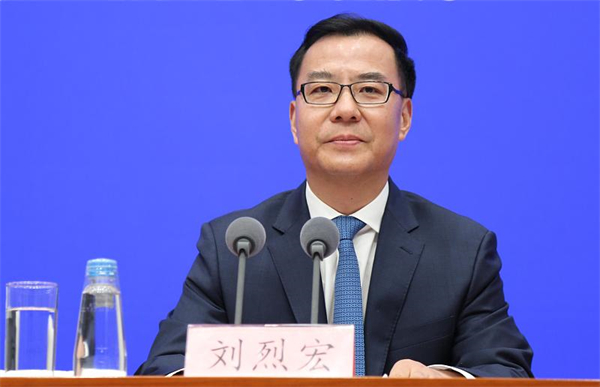
- Home
- Media Center
-
Events
- Wuzhen Summit
- Regional Forums
- Practice Cases of Jointly Building a Community with a Shared Future in Cyberspace
- World Internet Conference Awards for Pioneering Science and Technology
- The Light of Internet Expo
- Straight to Wuzhen Competition
- Global Youth Leadership Program
- WIC Distinguished Contribution Award
- Membership
- Research & Cooperation
- Digital Academy
-
Reports
- Collection of cases on Jointly Building a Community with a Shared Future in Cyberspace
- Collection of Shortlisted Achievements of World Internet Conference Awards for Pioneering Science and Technology
- Reports on Artificial Intelligence
- Reports on Cross—Border E—Commerce
- Reports on Data
- Outcomes of Think Tank Cooperation Program
- Series on Sovereignty in Cyberspace Theory and Practice
- Other Achievements
- About WIC
- 中文 | EN

Telecom veteran appointed nation's data bureau chief

Liu Liehong, head of China's national data bureau. [Photo/VCG]
Data: More efforts urged to explore pricing mechanism
China's appointment of Liu Liehong, former chairman of State-owned telecom operator China Unicom, as the head of its yet-to-be-officially-unveiled national data bureau is expected to lead to better integration, sharing, development and application of the country's data resources and develop the digital economy, experts said on Sunday.
They noted that Liu has more than three decades' experience in the electronics and information technology industry, and his appointment on Friday is in accordance with China's intensified efforts to promote digital development and accelerate the construction of basic systems for data.
Liu, 54, was appointed as chairman of China Unicom in August 2021. He took over the role after serving as vice-minister of industry and information technology from June 2020 to August 2021. Prior to that, Liu was the deputy head of the Cyberspace Administration of China from July 2018 to June 2020.
Liu's experience in holding key positions in government departments and working in the information and communication sector will help improve the governance efficiency of data resources, facilitate the standardized circulation and trading of data, and better implement the nation's big data strategy, said Pan Helin, co-director of the Digital Economy and Financial Innovation Research Center at Zhejiang University's International Business School.
Pan emphasized that data, as a new type of production factor, has been rapidly integrated into areas such as production, circulation, consumption and social services, adding that activating the potential of data elements is key to boosting the growth of the digital economy.
Wang Yong, deputy director of the Institute of Economics at Tsinghua University, said, "Liu's experience and vision will be conducive to pushing the country to further optimize the allocation of data resources, in addition to bolstering the digital transformation in traditional industries and promoting the in-depth integration of the digital and real economies."
China announced plans to establish a national data bureau in March.
The bureau, to be administered by the National Development and Reform Commission, will be responsible for advancing the development of data-related fundamental institutions and pushing forward the planning and building of a digital China, the digital economy and a digital society.
Ouyang Rihui, assistant dean of the China Center for Internet Economy Research at the Central University of Finance and Economics, said, "The establishment of a national data bureau is of vital significance in speeding up the building of a unified domestic data elements market, promoting the circulation and transaction of data and laying a solid foundation for the high-quality development of the digital economy."
More efforts are needed to promote the classification of data resources and confirmation of data-related rights, as well as to explore a data pricing mechanism and value assessment system, Ouyang added.
In February, China rolled out a plan for the overall layout of the country's digital development, vowing to make important progress in the construction of a digital China by 2025.
Data elements are playing an increasingly prominent role in promoting China's digital development, and safeguarding data security in the process of data transactions poses a huge challenge for enterprises, said Qi Xiangdong, chairman of Chinese cybersecurity company Qi-Anxin Technology Group.

The World Internet Conference (WIC) was established as an international organization on July 12, 2022, headquartered in Beijing, China. It was jointly initiated by Global System for Mobile Communication Association (GSMA), National Computer Network Emergency Response Technical Team/Coordination Center of China (CNCERT), China Internet Network Information Center (CNNIC), Alibaba Group, Tencent, and Zhijiang Lab.





